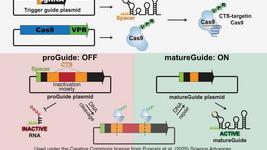CMN Weekly (23 June 2023) - Your Weekly CRISPR Medicine News
By: Gorm Palmgren - Jun. 23, 2023
Top picks
- Anxiety and other neurological disorders might be next in line for a CRISPR cure, according to new research in mice from the American genetic neuro-engineering company Cognigenics. The serotonin receptor gene HTR2A, which regulates mood and is implicated in anxiety and depression disorders, was targeted in the brain with CRISPR-Cas9. To overcome the blood-brain barrier (BBB), the researchers used intranasal delivery of an inactivated adeno-associated virus subtype 9 (AAV9) that carried vectors expressing Cas9 and gRNAs in neurons. The treatment led to an 8-fold reduction of HTR2A protein expression in mice after CRISPR and several behavioural tests demonstrated reduced anxiety in treated mice comparable to treatment with benzodiazepine diazepam.
- Chinese researchers have used adeno-associated virus (AAV)-mediated CRISPR-Cas9 to edit the vascular endothelial growth factor receptor 2 (VEGFR2) in retinal vascular endothelial cells in a mouse model of oxygen-induced retinopathy. The results showed that genome editing of VEGFR2 suppressed pathological retinal angiogenesis, indicating genome editing has a high potential for treating angiogenesis-associated retinopathies.
Research
- Researchers in China have used CRISPR-Cas9‑mediated knockout of the enhancer of zeste homolog 2 (EZH2) to suppress the proliferation and migration of triple‑negative breast cancer cells. Analyses showed that edited cells' tumour growth rate and proliferation and migration ability were significantly decreased after EZH2 knockout. These results indicate that EZH2 can have a crucial role in developing TNBC.
- French researchers have used CRISPR-Cas9 to generate human embryonic stem cell clones that can ultimately lead to a new therapy for the neurodevelopmental disorder Lesch-Nyhan disease (LND). Isogenic clones with deletions in HPRT1 - the cause of LND - were produced from one male human embryonic stem cell line using CRISPR-Cas9. Differentiating these cells into different neuronal subtypes will help elucidate the neurodevelopmental events leading to LND and develop therapeutic strategies for this devastating neurodevelopmental disorder.
- Researchers in the USA have presented statistical models for learning how prime editing efficiency is influenced by chromatin structure and context-dependent sequence features. Results show that regional constitutive heterochromatin and local nucleosome occlusion of target sites impede prime editing.
Industry
- Prime Medicine and Cimeio Therapeutics have announced a research collaboration to combine their respective technologies, including Prime Medicine's Prime Editing platform and Cimeio's Shielded Cell and Immunotherapy Pairs (SCIP) platform. The goal is to improve the safety and effectiveness of hematopoietic stem cell (HSC) transplants and to enable the in vivo selection of edited HSCs to remove the need for transplantation entirely.
- Precision BioSciences has presented positive preclinical data from its PBGENE-HBV development program for treating patients with chronic hepatitis B (HBV). In a mouse model, a 96% reduction in serum hepatitis B surface antigen (HBsAg) was achieved by targeting the company's ARCUS nuclease gene editing platform to HBV.
Detection
- A new CRISPR-Cas13a sensing system allows amplification-free and extraction-free miRNA detection in extracellular vesicles (EVs). The CRISPR-Cas13a sensing components are encapsulated in liposomes and delivered into EVs through liposome-EV fusion.
- Recombinase-aided amplification (RAA) and CRISPR-Cas12a are used in a new method for the ultrasensitive and rapid visual detection of the notorious pathogen E. coli O157:H7. The system showed high sensitivity and enabled detection as low as ~1 CFU/mL (fluorescence method) and 1 × 102 CFU/mL (lateral flow assay) of E. coli O157:H7.
Reviews and commentaries
- Recent advances and challenges in the use of CRISPR/Cas9 genome editing for understanding neuronal cell biology. This review discusses the last years' progress of CRISPR-Cas9 genome editing tools that have led to the reliable mapping of endogenous proteins in neurons, duplex labelling of two proteins simultaneously, and acute manipulation of protein distribution.
- CRISPR-Cas-based antimicrobials: design, challenges, and bacterial mechanisms of resistance. This review provides an overview of the main CRISPR-Cas systems utilised to create antimicrobials and highlights promising studies in the field. It also discusses the most commonly used mechanisms for CRISPR-Cas delivery - bacteriophages, nanoparticles, and conjugative plasmids - and addresses possible mechanisms of interference that should be considered during the intelligent design of these novel approaches.
- The current status of phage therapy and its advancement towards establishing standard antimicrobials for combating multidrug-resistant bacterial pathogens. This review presents the current state of phage therapy and its progression toward establishing standard medicine for tackling antibiotic resistance. Proposed mechanisms include gene-editing tools such as CRISPR-Cas that allow the bioengineering of phages to produce phage cocktails with broad-spectrum activities, which could maximise the treatment's efficacy.
- Predicting mutations generated by Cas9, base editing, and prime editing in mammalian cells. This review introduces the basics of DNA repair and machine learning that the prediction models rely on. It also includes an overview of the datasets and methods created for characterising edits at scale and the insights derived from them.
- Detection and quantification of unintended large on-target gene modifications due to CRISPR-Cas9 editing. This review summarises the recent advances in analysing significant on-target gene editing outcomes and their implications for clinical application and discusses opportunities for future improvements.
Webinars and perspectives
- CRISPR Medicine News is hosting a webinar entitled "Taking the guesswork out of drug development: CRISPR-Select validates drug targets and drug responders early and conclusively" on Wednesday, June 28, at 3:00 pm-4:00 pm CEST. Dr Morten Frödin will discuss the versatile, functional assay that can conclusively address all critical drug and drug target development questions. You can read our CMN interview with Morten Frödin and his co-worker Claus Storgaard Sørensen here.
- An online audio interview from the New England Journal of Medicine reveals the story of a teenager in remission from previously relapsed lymphoblastic leukaemia. Host Rachel Gotbaum talks with the investigator who developed the "off-the-shelf" CAR T cells that made her treatment possible.
- A risk-analysis response to liberal eugenics discusses whether germline gene editing with CRISPR should give parents the freedom to choose their children's genetics. The authors argue that we can only know the risks of this technology for future generations by actually using the technology to make offspring who have been genetically engineered with CRISPR.
- An International Journal of Surgery: Global Health editorial calls CRISPR gene technology the next best thing in medicine. It proposes that CRISPR-Cas9 could be one of the most significant technological breakthroughs of our time, and, as such, it can be viewed as a modern-day equivalent of Fleming's discovery of antibiotics in terms of its potential to revolutionise medicine.
Huh, heh, wow
- A transparent albino squid has been produced by American scientists who used CRISPR-Cas9 to deactivate two pigmentation enzymes in the invertebrate. The feat can be used for live imaging neural activity in these behaviorally sophisticated organisms.
News from CRISPR Medicine News
- Monday, we wrote about a dual CRISPR strategy to eliminate HIV in humanised mice. We interviewed the two senior authors - Howard Gendelman and Kamel Khalili - and learned about their approach for a one-shot CRISPR cure for HIV that has proved to eliminate the replication-competent virus in 58% of infected mice.
To get more of the CRISPR Medicine News delivered to your inbox, sign up to the free weekly CMN Newsletter here.
Tags
CLINICAL TRIALS
IND Enabling
Phase I
Phase II
Phase III
Gastric Cancer and Colorectal Cancer, CRC, (NCT07166263)
Sponsors:
Base Therapeutics (Shanghai) Co., Ltd.
Sponsors:
Base Therapeutics (Shanghai) Co., Ltd.
IND Enabling
Phase I
Phase II
Phase III
Relapsed or Refractory Acute Myeloid Leukemia, AML, (NCT06541444)
Sponsors:
Base Therapeutics (Shanghai) Co., Ltd.
Sponsors:
Base Therapeutics (Shanghai) Co., Ltd.
IND Enabling
Phase I
Phase II
Phase III







